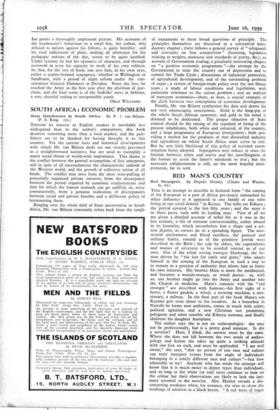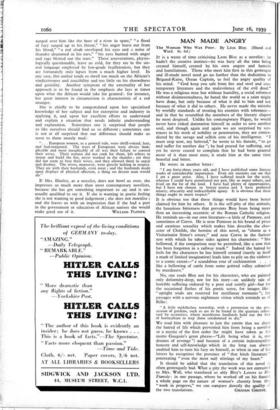RED MAN'S COUNTRY Tins is an attempt to describe in
fictional form " the coming of the European to a part of Africa previously untouched by white influence as it appeared to one family of one tribe living in one small district " in Kenya. The tribe are Kikuyu ; the period covered is the last fifty years ; and the story is in three parts, each with its leading man. First of all we are given a detailed account of tribal life as it was in the last century, a life of extreme conventionality, rather absurd in its formality, which nevertheless lent a shape and a cer- tain dignity, as corsets do to a spreading figure. The cere- monial uncleanness and blood sacrifices, the pastoral and military habits, remind us of the primitive Jewish ways described in the Bible ; the rule by elders, the superstitions and masses of solecisms to be avoided remind us of our own. Out of the tribal setting emerges Muthengi, the he- man driven by " the lust for cattle and glory," who adapts himself to the coming of the European in such a way as to remain in a position of authority that allows him to foster his own interests. His brother Matu is more the intellectual, and becomes a mundu-mungu, or witch doctor : so, with us, one brother might go into the Army and another into the Church or medicine. Matu's contacts with the " red stranger " are described with humour—his first sight of a horse, a flower garden, a wheel, a mowing machine, a mis- sionary, a railway. In the final part of the book Matu's son Karanja gets even closer to the invaders. As a houseboy in Nairobi he forms new ambitions, comes in touch with crime, political agitation, and a- new Christian sect permitting polygamy and other sensible old Kikuyu customs, and finally christens his daughter Aeroplane.
The author says she is not an anthropologist : she may not be professionally, but is a pretty good amateur. Is she a novelist? Here, I think, the answer must be the same. Where she does not fall between the two stools of anthro- pology and fiction she takes up quite a striking attitude with one foot on each, and must be applauded. " I am well aware," she says, " that no person of one race and culture can truly interpret events from the angle of individuals belonging to a totally different race and culture "—but how admirable to try! Anybody who has made the attempt will know that it is much easier to depict types than individuals, and so long as the white (or red) races continue to lean on the colour bar their observations are likely to lack the inti- macy essential to the novelist. Mrs. Huxley reveals a dis- concerting weakness when, for instance, she tries to show the workings of emotion in a black breast. " A red wave of anger
surged over him like the bore of a river in spate," " a flood of fury surged up in his throat," "his anger burst out from his blood," " a red cloak enveloped his eyes and a noise of thunder drummed in his ears," " his eyes burned with anger and rage blotted out the stars." These asseverations,- physio- logically questionable, leave us cold, for they are in the un- real language employed by low-grade feuilletonists, but they are fortunately only lapses from a much higher level. In any case, this author tends to dwell too much on the African's vindictiveness and irascibility and too little on his shrewdness and geniality. Another symptom of the externality of her approach is to be found in the emphasis she lays at times upon what the African would take for granted : for instance, her great interest in circumcision is characteristic of a red stranger.
She is chiefly to be congratulated upon her specialised knowledge of her subject and her enterprise and industry in applying it, and upon her excellent efforts to understand and explain a situation that needs infinite understanding and explanation. Sometimes one is surprised that people so like ourselves should find us so different ; sometimes one is not at all surprised that our difference should make us seem to them merely mad:
" . . European women, as a general rule, were shrill-voiced, lazy, and bad-tempered. The ways of Europeans were always inex- plicable and most inexplicable of all was their failure to control their wives. Their women did not cook for them, left others to sweep and build the fire, never worked in the shamba ; yet they did not seem to beat their wives, and they allowed them to argue and disobey. The wives, moreover, were grossly lacking in respect. They ate with their husbands, even meat ; and the husbands made open displays of physical affection, a thing no decent man would do."
If Mrs. Huxley, as a novelist, does not bowl us over, she impresses us much more than most contemporary novelists, because she has got something important to say and is un- usually qualified to say it. If she is wanting in poetic feeling
she is not wanting in good judgement ; she does not moralise ; and she leaves us with an impression that if she had a part in the government or education of African natives she would























































 Previous page
Previous page